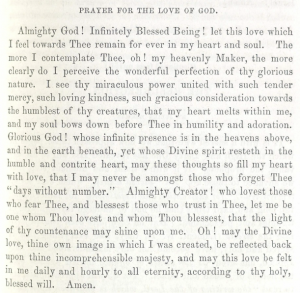| Hebrew | Source (English) |
|---|---|
Almighty God! Infinitely Blessed Being! let this love which I feel towards Thee remain for ever in my heart and soul. | |
The more I contemplate Thee, oh! my heavenly Maker, the more clearly do I perceive the wonderful perfection of thy glorious nature. I see thy miraculous power united with such tender mercy, such loving kindness, such gracious consideration towards the humblest of thy creatures, that my heart melts within me, and my soul bows down before Thee in humility and adoration. | |
Glorious God! whose infinite presence is in the heavens above, and in the earth beneath, yet whose Divine spirit resteth in the humble and contrite heart, may these thoughts so fill my heart with love, that I may never be amongst those who forget Thee “days without number.”[1] Jeremiah 2:32 partial | |
Almighty Creator! who lovest those who fear Thee, and blessest those who trust in Thee, let me be one whom Thou lovest and whom Thou blessest, that the light of thy countenance may shine upon me. Oh! may the Divine love, thine own image in which I was created, be reflected back upon thine incomprehensible majesty, and may this love be felt in me daily and hourly to all eternity, according to thy holy, blessed will. Amen. |
This prayer and “A Prayer for Knowledge of the Messiah” were published as “Two Short Prayers” with a lengthy introduction probably penned by Isaac Leeser in the Occident 9:5, Ab 5611/August 1851, p.253-255. Leeser wrote:
Our fair correspondent, who has so often enriched our pages by her elegant and deep-toned poetical contributions, has lately turned her attention to the composition of prayers for her own edification, and she has sent us two as specimens of her work and we have no doubt that, if these awaken a corresponding feeling of what she has experienced in others, she may be induced to publish a small volume of devotional pieces, for the improvement of her people. Lightly as many may conceive the effort of writing or composing prayers, there is perhaps not one so extremely difficult in all the range of literature. The Psalms and Hymns of Scriptures are only prayers of various kinds; and yet how unattainable in excellence have they always proved themselves to their imitators. Still the heart feels occasionally impelled to pour itself out in either entreaty or thanks, and we look in vain for a biblical psalm just corresponding to our sensations of the moment. It is then that we naturally desire to have a manual of devotion, which may aid us to fashion our thoughts into prayers; and the closer, there fore, any writer can fathom the inborn wants and imperfections of the human heart, the better guide he becomes to us in our private hours of devotion. The prayer-book embraces a great variety of petitions, we gladly acknowledge, and there are but few public occasions when we need anything beyond its contents.
But we speak now of the house, the bed-chamber, the solitary walk, the lonely hour, when we are not rarely reminded of our dependence on, of our necessity of divine aid, which we would gladly invoke, had we but words to express suitably our inward sensations. Every one is not endowed with the power of continued reflection, to string word on word, and thought on thought, so as to make the whole a suitable gift or petition to the Supreme. If, therefore, we can have another to think for us, we must needs call him our benefactor. The teachers of Israel have always acknowledged this, and hence there are a great variety of occasional prayers, composed in the language of the people, both of the barbarous jargon which was once customary in Europe, and the more refined dialects of modern times. It is needless to say that the ancient matter can be of little use at the present day, as both ideas and language are antiquated; but modern compositions, although occasionally beautiful, have failed, for the most part, to answer the end in view, for the simple reason that the authors could not think for the people. If it were necessary, we could exhibit proofs of this fact; but we are not about to indite a criticism on prayer, but merely to introduce specimens of an unpublished work.
It is enough, therefore, to say that, though in Germany some excellent attempts have been made to supply the natural want of a domestic manual of occasional devotion for Israelites, the English language is almost without any such pieces at all, the few of the late Miss Aguilar, which, however, we have not read, being, as far as known to us, the only collection that has appeared in print. We therefore hope that the effort may be farther pursued by our gifted friend, and others who are willing to devote their hours to the sacred service, so that especially those who are not familiar with the Hebrew may have the means to commune with their heavenly Father in meekness of spirit. We would only caution all who make the attempt to take heed how they mix their own private thoughts in their outpourings; for, however blissful in its effects a prayer for the moment may be to the individual, it cannot make a good impression on another, who may never be placed in similar circumstances.
Prayers like those we speak of should be universal, to be of the least value, and then they should be free from familiarity, and entirely Scriptural in their construction; for only thus can they be tolerated alongside of the prayer-book and the Psalms of the Bible.—Ed. Oc.
Source
Click to access Two-Short-Prayers-by-Rosa-Emma-Salaman-from-The-Occident-August-1851.pdf
Notes
| 1 | Jeremiah 2:32 partial |
|---|

“A Prayer for the Love of God, a poem by Rosa Emma Salaman (1851)” is shared through the Open Siddur Project with a Creative Commons Public Domain Dedication 1.0 Universal license.










Leave a Reply